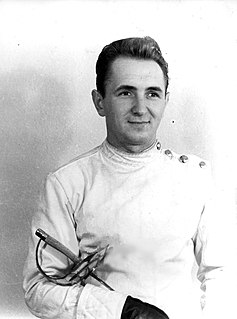 W
WAnatol Fejgin was a Polish-Jewish communist activist before World War II, and after 1949, commander of the Stalinist political police at the Ministry of Public Security of Poland, in charge of its notorious Special Bureau. During the Polish October revolution of 1956, his name – along with a number of others including his colleague Col. Józef Różański, and Minister Jakub Berman – came to symbolize communist terror in postwar Poland.
 W
WMichał Goleniewski a.k.a. 'SNIPER', 'LAVINIA',, was a Polish officer in the People's Republic of Poland's Ministry of Public Security, the deputy head of military counterintelligence GZI WP, later head of the technical and scientific section of the Polish intelligence, and a spy for the Soviet government during the 1950s. In 1959, he became a triple-agent, giving Polish and Soviet secrets to the Central Intelligence Agency, which directly caused the exposure of George Blake and Harry Houghton. Goleniewski defected to the United States in 1961. He later made unsubstantiated claims to be Tsarevich Alexei Nikolaevich of Russia.
 W
WJuliusz Samsonowicz Hibner was a brigadier general in the Polish People's Army and recipient of the title of Hero of Soviet Union. He also served as the commander of the Internal Security Corps and later became a nuclear physicist.
 W
WKlementyna Mańkowska was a member of the Polish resistance and agent of Polish and British intelligence services during World War II.
 W
WStefan Michnik was a military judge of the Soviet-dominated regime in post-World War II Poland, and a captain in the communist Polish People's Army. He was involved in the politically-motivated arrest, trial, imprisonment and/or execution of a number of Polish anti-communist fighters and activists. Many of those persecuted by Michnik also fought against Nazi Germany during World War II, as members of the Polish resistance.
 W
WJerzy Władysław Pawłowski was a Polish fencer and double agent.
 W
WStanisław Radkiewicz was a Polish communist activist with Soviet citizenship, a member of the pre-war Communist Party of Poland and of the post-war Polish United Workers' Party (PZPR). As head of the Ministry of Public Security of Poland between 1944 and 1954, he was one of the chief organisers of Stalinist terror in Poland. He also served as a political commissar and was made a Divisional General in Communist Poland.
 W
WMarcel Reich-Ranicki was a Polish-born German literary critic and member of the literary group Gruppe 47. He was regarded as one of the most influential contemporary literary critics in the field of German literature and has often been called Literaturpapst in Germany.
 W
WRoman Romkowski born Natan Grünspan-Kikiel, was a Polish communist official trained by Comintern in Moscow, who settled in Warsaw after the Soviet takeover, and became second in command the Ministry of Public Security during the late 1940s and early 1950s. Along with several other high functionaries including Stanisław Radkiewicz, Anatol Fejgin, Józef Różański, Julia Brystiger and the chief supervisor of Polish State Security Services, Minister Jakub Berman from the Politburo, Romkowski came to symbolize communist terror in postwar Poland. He was responsible for the work of departments: Counter-espionage (1st), Espionage (7th), Security in the PPR–PZPR, and others.
 W
WJózef Różański was an officer in the Soviet NKVD Secret Police and later, a Colonel in the Polish Ministry of Public Security (UB), a communist secret police. Born into a Polish-Jewish family in Warsaw, Różański became very active in the Communist Party of Poland before World War II. He joined the NKVD following the Soviet invasion of Poland and after the war, adopting the name Różański, served as an agent with the Polish Communist Security apparatus.
 W
WJózef Światło, born Izaak Fleischfarb, was a high-ranking official in the Ministry of Public Security of Poland (UB) who served as deputy director of the 10th Department run by Anatol Fejgin. Known for supervising the torture of political prisoners, he was nicknamed "the Butcher" by the detainees.
 W
WMarian Zacharski, is a former Polish intelligence officer, arrested in 1981 and convicted of espionage against the United States. After four years in prison, he was exchanged for American agents on Berlin's famous Glienicke Bridge. Arguably, he was one of the most famous officers of the Polish intelligence service. In 1996, prosecutors in Warsaw charged him with flagrant mismanagement at the Pewex company, and Gorzów Wielkopolski police want to question him about illegal car trading.